TRAUMA, GROWTH, AND HOPE
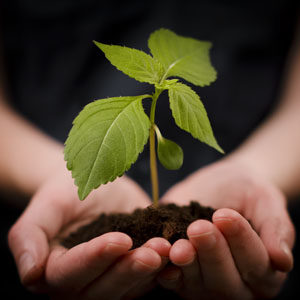 We’ve all been having some difficult conversations lately. And between COVID, the divisiveness in our country, the fires raging in CA and in our hearts, it’s hard not to feel anxious and depressed.
We’ve all been having some difficult conversations lately. And between COVID, the divisiveness in our country, the fires raging in CA and in our hearts, it’s hard not to feel anxious and depressed.
This week’s newsletter may not seem uplifting—at least on the surface. This week, I’m writing about trauma.
Trauma is possibly one of the heaviest topics we can bring to the table and most probably underlying many of the problems our country is facing. In fact, I believe we’re all experiencing a form of collective, national trauma right now.
Having said that, the last thing I want to do in this post is bring you down. I’m approaching the topic with hope. And I sincerely hope you will stick with me here—and find some light in the post as well.
Traumatic Events Can Serve as Markers—the Placeholders between the Before and the After
When you’ve lived as many years as many of us have, it is almost impossible not to have encountered some trauma along the way. It may have been a specific event, a moment in time that serves as a marker, an event that delineates our lives into the before and the after. Once the event has occurred there is no going back to the before, but, hopefully, we reckon with the event and do our best to shape the after into a path of learning, healing, and growth.
 Others of us cannot point to one specific happening. Our trauma has been more insidious, sneaky, building over time. Sometimes, as with verbal, emotional, physical or sexual or institutional abuse, the trauma—or the memory of it—has become so much a part of our everyday lives that we don’t even recognize it for what it is. We may sense something is amiss but can’t put our finger on it.
Others of us cannot point to one specific happening. Our trauma has been more insidious, sneaky, building over time. Sometimes, as with verbal, emotional, physical or sexual or institutional abuse, the trauma—or the memory of it—has become so much a part of our everyday lives that we don’t even recognize it for what it is. We may sense something is amiss but can’t put our finger on it.
We may be in denial, tell ourselves, “it’s no big deal,” or compare our experiences favorably to those of people whom we believe have experienced far worse. One of the biggest dangers here is when we keep our experiences hidden from even ourselves. It helps a great deal when we name it.
Much of this type of trauma is intergenerational, passed on from mother or father to daughter or son, from grandparents and their grandparents too.
Whether It Is Biological or Environmental, Or A Combination of Both, Trauma Certainly Travels the Generational Pipeline
The study of intergenerational trauma in psychology has recently become “a thing.” Geneticists are getting on the bandwagon too. Trauma, it seems, according to a survey of the scientific literature , may even be passed on biologically through generations. Benedict Cary, in his NYTimes article “Can We Really Inherit Trauma” explains: “The idea is that trauma can leave a chemical mark on a person’s genes, which then is passed down to subsequent generations. The mark doesn’t directly damage the gene; there’s no mutation. Instead it alters the mechanism by which the gene is converted into functioning proteins, or expressed. The alteration isn’t genetic. It’s epigenetic.”
Epigenetics is a controversial field. The jury is still out on whether trauma transmission in humans does have a biological base. But whether it is biological, environmental, or a combination of both, trauma certainly travels the generational pipeline.
Soul Wounds—Is There Any Deeper Hurt?
 A great deal of this research was inspired by the effects of trauma on Holocaust survivors’ children and grandchildren. Similar studies—and results—have been found with other groups who have faced cultural oppression, such as Native Americans. Current studies are also looking at the intergenerational effects of slavery on African Americans, especially when it involves increased health risks.
A great deal of this research was inspired by the effects of trauma on Holocaust survivors’ children and grandchildren. Similar studies—and results—have been found with other groups who have faced cultural oppression, such as Native Americans. Current studies are also looking at the intergenerational effects of slavery on African Americans, especially when it involves increased health risks.
Indigenous people call such trauma the soul wound. Wounding of the soul—is there any deeper hurt?
I’ve been thinking a lot about trauma lately. Our news cycle gives me good reason. But I am also currently working on a memoir about my own family’s intergenerational trauma and the legacy of betrayal that has informed much of my life. I’ve done years of work in all different healing modalities—energy healing (see my interview with Laura Malfa), talk therapy, coaching, even a brain-based therapy developed by David Grand, PhD. called Brainspotting. Still, I can sometimes get triggered.
You Can Change the Ending
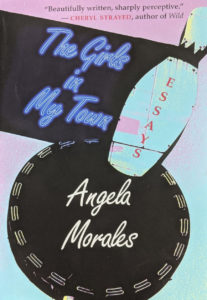 I recently wrote a stand-alone essay based on the events in my memoir. After I finished the essay, difficult feelings remained. I couldn’t seem to get past them. And then I spoke with Angela Morales, a wonderful writer and teacher and the author of one of my very favorite books of all time—The Girls in My Town. When I shared with Angela how I was struggling, she told me that one of the beauties of writing your trauma is being able to change the ending.
I recently wrote a stand-alone essay based on the events in my memoir. After I finished the essay, difficult feelings remained. I couldn’t seem to get past them. And then I spoke with Angela Morales, a wonderful writer and teacher and the author of one of my very favorite books of all time—The Girls in My Town. When I shared with Angela how I was struggling, she told me that one of the beauties of writing your trauma is being able to change the ending.
I took her words to heart and went back to the essay that I’d ended with a rather dark scene. Wondering if my difficult feelings were related to that darkness, I decided to switch things up. When I ended the essay on a note of growth and change, I immediately felt both a sense of relief and release.
No one can wave a magic wand and make trauma disappear, but we can take back our power. We all have the right and ability to decide what meaning we give that trauma in our lives.
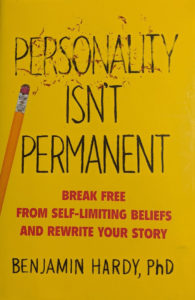 If you’d like to read more about changing the meaning trauma carries for you, I highly recommend Benjamin Hardy’s new book Personality Isn’t Permanent. I wrote about him in a previous blog, but what I appreciate in his new book is that he devotes quite a few pages to trauma–and how to gain power over its effects. That’s NOT the same as excusing inexcusable behavior or “making nice” with traumatic events. Hardy talks, instead, a lot about reframing experiences and about the importance of focusing on the “gains” you’ve made rather than on the “gaps.” Reframing is viewing the events through the lens of where you are now, on valuing your strength and your survival.
If you’d like to read more about changing the meaning trauma carries for you, I highly recommend Benjamin Hardy’s new book Personality Isn’t Permanent. I wrote about him in a previous blog, but what I appreciate in his new book is that he devotes quite a few pages to trauma–and how to gain power over its effects. That’s NOT the same as excusing inexcusable behavior or “making nice” with traumatic events. Hardy talks, instead, a lot about reframing experiences and about the importance of focusing on the “gains” you’ve made rather than on the “gaps.” Reframing is viewing the events through the lens of where you are now, on valuing your strength and your survival.
No Wasted Pain—Trauma and Growth
While writing this post, I came across a wonderful article in Next Avenue, a terrific online resource for people over 50. We’ve all heard of PTSD (post traumatic stress disorder) but have you ever heard of PTG (post traumatic growth)? Barbara Williams Cosentino introduced me to the concept first developed by Dr. Richard G. Tedeschi in the 1990s in her article “When Trauma Leads to Growth.”
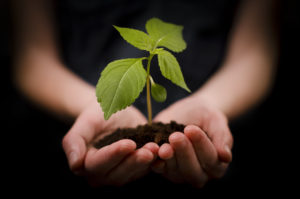 PTG is different than resilience, claims Tedeschi. Resilience, according to dictionary.com is the “ability to recover readily from illness, depression, adversity, or the like; buoyancy.” PTG does not describe the experiences of “recovering readily” and “buoyancy.” PTG, it seems, occurs only after one has sunken to some measurable depths.
PTG is different than resilience, claims Tedeschi. Resilience, according to dictionary.com is the “ability to recover readily from illness, depression, adversity, or the like; buoyancy.” PTG does not describe the experiences of “recovering readily” and “buoyancy.” PTG, it seems, occurs only after one has sunken to some measurable depths.
People who have experienced PTG have gone through a transformative process because of their pain. They didn’t simply bounce back. They’ve changed. Grown. To me, that speaks of great hope.
(I also just recently saw an incredibly powerful documentary The Prison Within about a trauma-addressing program in San Quentin Prison, where men who have been convicted of murder meet in a group with trained facilitators, many of whom are survivors of trauma. One woman who attended one of the meetings is the widow of a police officer slain while on duty. I don’t want to give anything away here, but the transformation that occurs in both groups is truly awesome–and I don’t use that word lightly. The power to heal and find connection blew me away. I recommend the documentary highly–as long as you have a box of tissues close by.)
Reading Memoirs Validates Our Own Feelings and Experiences and Helps Us Feel Less Alone
Why are so many of the most best-selling memoirs ones that deal with personal trauma? Why do we read them–voraciously?
Because trauma survivors often hold shame around their trauma, blame themselves–at least in part–for the trauma itself or for their response to it, they will often keep their experiences under wraps. Shame is extremely toxic and thrives in the dark. One of the most effective ways to release the shame is to find a trusted witness for your story. Writing memoir can provide a wide circle of witnesses.
And we read memoirs about trauma, not because we’re voyeurs, but because we see something of ourselves and of our own experiences on those pages. When others bring their own experiences to the light–and we read them–our own feelings and experiences are validated. We feel less alone.
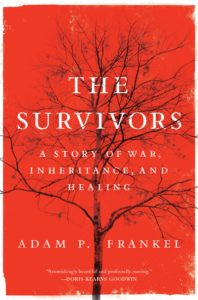 I was on the treadmill one morning a few months ago, starting my day watching Morning Joe, when Mika Brzezinski interviewed Adam Frankel, a former Obama speech writer, about his book The Survivors: A Story of War, Inheritance, and Healing.
I was on the treadmill one morning a few months ago, starting my day watching Morning Joe, when Mika Brzezinski interviewed Adam Frankel, a former Obama speech writer, about his book The Survivors: A Story of War, Inheritance, and Healing.
As I listened to Frankel speak, I almost fell off the treadmill. While the details of his story differed from mine in many ways, much of what he had to say felt incredibly familiar. Both of our families had trauma roots in Nazi Germany; both of our mothers had affairs—and carried huge secrets. I felt that morning as if Frankel was telling my story.
There is much in common in the stories of those who have been impacted by intergenerational trauma. It’s uncanny how many similarities there are in terms of the damage done and how that damage manifests.
Having Survived Trauma, by Definition, Means You Have Survived
But all is not grim. (Remember PTG!)
Having survived trauma, by definition, means you have survived, and wherever there’s life, there’s hope. It is possible to break cycles, so future generations are not saddled with our pasts. Frankel’s is a story of hope and breaking his family’s cycles, of healing that deep soul wound.
I wrote a review of Frankel’s book that was first published on August 5 in The Rumpus. I am proud of how it came out and would like to share it here. Thank you to The Rumpus for publishing it and to Chelsea Leu, the book review editor, for encouraging me to go deeper and explore my own connections to the book. And thanks to Adam Frankel for showing such great courage on the page and for sharing his moving story of family bonds and hope.
Thanks also to David Groff for his wonderful edits, to Gabriella Souza Emmett for her wise feedback and support, and to Steven, my husband, who’s my greatest cheerleader and the man who’s taught me how to live with (much) less drama.
If you’d like to read the review, just click TRAUMA AS INHERITANCE: ADAM P. FRANKEL’S THE SURVIVORS!
As always, I’d love to hear your thoughts. How have the threads of trauma run through your family’s life? Which cycles have you broken and how? Are there any places where you still feel stuck?
Please leave a comment or send me an email.
See you September 21st!
XOXO
Diane



Diane! Your post is amazing by itself, and then I read your book review. WOW. I look forward to reading the book, but this may be a case where the review is even more impactful to me. Thank you for sharing what it meant to you personally. So powerful and relatable.
Thank you so much Sherry! The book impacted me deeply. I’m so glad that came across in the review. XO
Thank you for writing about trauma, Diane. I agree with your assessment of our national trauma. It’s been one thing on top of another; the negligent mismanagement & denial of the pandemic (I was outraged when it was referred to in the past tense at the RNC), on top of the pandemic itself, etc. You captured my burning turmoil with your phrase ‘the fires raging in California and in our hearts.’ My two daughters live in Northern Cali where it’s hard for them to breathe, now for an additional reason.
The subjection of women in my South Asian culture seems like it would be a generational trauma. It has taken my mum decades to stand up to my dad and become an equal partner in their relationship. She’s reflective & has expressed regret over some of the parenting I & my three sisters experienced, even though she was a victim herself. But my dad maintains, to this day, that he did nothing wrong, & his father did nothing wrong either. He is still clinging to an impossible ideal, the belief that parents are never wrong.
I did my best to raise two strong daughters who know their worth. And, of course, I failed them in ways I was oblivious to, until they were brought to my attention last year when tensions were high because my older daughter was getting married (!!)
I identify with the tendency to minimize our own traumas, & I agree that we must name them, for our own healing. I have been doing that very recently.
You did indeed succeed, my friend; this post is full of light & hope & wisdom. And it’s interesting. Thank you for introducing me to new ideas/tools I can use in my healing journey.
Sarita! Thanks so much for your thoughtful comments. I am thinking of your daughters and everyone up in Northern CA. So tragic.
Your own family and cultural intergenerational trauma is so interesting–isn’t the women who always learn/grow first?!?
I had to laugh about your daughter bringing your “failings” to your attention–we just never get off the hook, do we!
And wonderful that you are doing some naming! I find that to be incredibly healing–and so simple, actually. Courageous!!
Hi Diane,
Are you giving a workshop on the 21st? I am extremely interested in this area of research.
Thank you,
Eve Linn
Hi Eve Linn! I am not giving any workshops on trauma. I’m wondering if you’re talking about the 2020 Collective Trauma Summit? Here’s the link for the information for that: https://collectivetraumasummit.com.
Diane – Deciding the ending is such a powerful way to think of reclaiming our power.
Thanks for the post on trauma – so many resources! Look forward to your memoir!
Thanks, Nicky! I loved that part too!
Looking forward to your memoir soon!
I recognize myself in several parts of this essay… comparing my trauma to others’ and feeling is not as big and why then it affected me so, the need to tell my story and release it to willing witnesses… great article!
Thank you, Isidra! Unfortunately, too many of us recognize ourselves in the essay, but the hope factor and the healing is huge. So excited for you to tell your story and “release it to willing witnesses!”
Diane,
This is an amazing share. Trauma with growth is not what one usually hears about, thank you for this.
Cannot wait to read your memoir!
Thank you, DeAnna! Trauma with growth is not what we usually hear. The possibility adds so much hope!
Diane Gottlieb, you continue to grow and astound! Incredible column. And, no doubt yours is the memoir we wait impatiently for!
Thank you, dear Elaine! I’m waiting for your memoir too!!!
What a great column today. It speaks to so much of what I’ve been ruminating on the last few years. One of my one-day workshops, “The Transformation of Trauma” (which I offer for free) incorporates many of the techniques you’re writing about here. I’m going to save all these resources and links – thanks, Diane.
Thank you so much, Alison. I’d love to hear more about “The Transformation of Trauma”! You do soooooo many wonderful workshops. I’d love to take that one–can you send me a link if it’s available?
Sure! I haven’t scheduled my next round of workshops yet, but they’ll probably be in January. I’ll be sure to put you on the email list if you’re not already on it. XO
Wonderful! And if it’s all right with you, I’ll share it with my readers! XO